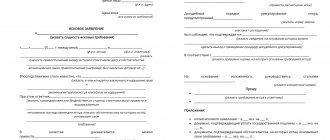Features of inheritance disputes
In order to reduce the number of controversial issues in inheritance law, in 2012, at the Plenum of the Supreme Court of the Russian Federation, it was decided to discuss the problems arising in the courts in inheritance cases and provide written explanations on aspects of the legislation that caused the greatest difficulties for lawyers and ordinary citizens.
In particular, based on the results of the Plenum, categories of cases requiring consideration in courts of general jurisdiction and district courts were determined. Clarifications were given regarding the place of filing the claim, as well as the grounds for refusing to accept it.
In its explanations, the court touched upon various aspects of inheritance by will and by law, as well as the rights of heirs to refuse the property due to them. Other issues were also considered.
Inheritance cases involve a lot of nuances. Some of them are known to almost everyone, while others are not even known to most ordinary citizens. Let's look at some features of the consideration and resolution of cases related to inheritance.
Many people mistakenly believe that if the testator did not manage to register the living space as private property during his lifetime, the heirs will definitely not get it.
This is not quite the case.
Legislation allows you to inherit non-privatized real estate if the former owner attempted to privatize it during his lifetime:
- submitted a corresponding application to the housing policy department;
- collected documents and issued a power of attorney to a third party from a notary, who was supposed to formalize the privatization for him.
Even if the papers were not accepted by the authorized body for some reason, for example, due to incorrect drafting, the court will not take this into account.
Courts often have to consider issues of transfer, along with the actual estate of inheritance, of the rights and obligations of the testator. The reason for this is that many citizens do not understand two basic rules of inheritance:
- Along with the property, financial obligations also pass to the heirs. This means that if, for example, there were some debts on the apartment, then the heir who received the housing is obliged to pay them off. True, obligations should not materially exceed the value of the property itself.
- By inheritance, rights that are tied to the personality of the testator are not transferred: the right to social benefits or alimony.
We invite you to familiarize yourself with: Refusal of inheritance by law in 2021
And in conclusion, we remind you once again: no matter how deep your knowledge of law is, if legal questions arise, and especially conflicts, you must immediately contact a lawyer. This will give a chance for the fastest and most favorable resolution of the case.
Judicial practice on reducing the mandatory share of inheritance
A reduction in the mandatory share is possible in those cases specified in clause 4 of Art. 1149 Civil Code of the Russian Federation:
- First of all, the obligatory share can be reduced by a court decision in the case where, having exercised the heir's right to the obligatory share, the main heir will not be able to receive the inheritance under the will;
- If the heir who has the right to an obligatory share never used this property during the life of its owner;
- The court may reduce the share of a compulsory heir if this property is the only home of the heir under the will, or it was used by this person as the main source of income necessary for life.
Important! If in the specific case under consideration all the above circumstances are present in combination, then the court may decide to reduce the mandatory share.
But there is another important point, this is the property status of the heirs of the compulsory share. The court must take this fact into account.
It is impossible to say that all courts make the same decision in such situations. It all depends on the specific case and specific circumstances.
We invite you to consider several examples from judicial practice
It was previously mentioned that the court must take into account the financial situation of the heir to the compulsory share. At the same time, the financial situation of the heir under the will in accordance with the law does not matter at all (clause 4 of article 1149 of the Civil Code of the Russian Federation).
What conclusions can be drawn by considering specific court decisions?
The court, taking into account the fact that the plaintiff is the son of the deceased testator and a disabled person of group II, granted the claim for recognition of his right to an obligatory share.
To prove to the court that he did not have any housing, the plaintiff presented an extract from the Unified State Register of Rights to Real Estate and Transactions with It. (See: Decision of the Kirov City Court of the Leningrad Region dated February 21, 2012 in case No. 2-18).
The court decided to refuse to reduce the obligatory share in the inheritance, as required by N.’s claim against I.
At the same time, the fact that I. is a pensioner and a disabled person of group II was taken into account, and the amount of his pension is xxx (data not available).
Having studied the case materials, the court did not consider it possible to reduce I.’s obligatory share, since the evidence presented by N. was not sufficient for the court to decide in his favor. (See: Appeal ruling of the Kurgan Regional Court dated April 16, 2013, in case No. 33-996/2013).
Who is the obligatory heir if there is a will?
How to calculate the obligatory share in the inheritance, read here.
Read about the concept of a mandatory share in an inheritance at the following link:
A rather interesting conclusion can be found in a court decision in one of the civil cases
The court rejected the claim of the heir under Z.'s will against the heir of the obligatory part of D. for refusal to allocate the obligatory share in the inheritance. This conclusion was not accidental, and the court of first instance explained it by the fact that the basis for reducing the mandatory share or refusing to allocate such a share due to the circumstances that were specified in paragraph 4 of Art. 1149 of the Civil Code of the Russian Federation, the volume of property inherited under the will became insufficient to cover the obligatory share.
There are no other grounds for reducing the size of the obligatory share in the inheritance or refusing to allocate it. But in this case, when making a decision, the court did not take into account the financial situation of the heir to the compulsory share.
The heir under the will, Z., filed an appeal. The Court of Appeal confirmed the decision of the trial court. At the same time, he noted that the fact that the court did not consider the property status of the heir under the will and the heir to the compulsory share will not in any way affect the change in the decision of the trial court.
The fact is that the heir’s obligatory share of real estate in personal ownership or use, as well as the financial situation of the heir under the will, are in no way related to the essence of the trial.
In addition, these facts cannot affect the deprivation of the right of a compulsory heir to allocate a share in the inheritance, as well as the right to property that was acquired jointly with the testator.
In this case, the court also did not take into account the arguments of the complaint against the Determination of the Constitutional Court of the Russian Federation dated December 9, 1999 N 209-O, since this Determination is the result of checking the compliance of the Constitution of the Russian Federation with Article 535 of the Civil Code of the RSFSR.
Speaking about a specific case, it should be noted that Art. 535 of the Civil Code of the RSFSR has nothing to do with the legal relations of the parties to this case.
Moreover, the section “Inheritance Law” of the Civil Code of the RSFSR lost its force on March 1, 2002 in accordance with Federal Law No. 147-FZ of November 26, 2001.
What will the court do if the testator deprived the heir of his obligatory share of the inheritance in his last will?
It should be noted that the fact that a compulsory heir is deprived of an inheritance by the testator himself cannot in any way affect the allocation of a compulsory share to him.
The obligatory share is the only factor that limits the freedom of will.
In the specifically examined court case, the court, in the claim of a compulsory heir for recognition of his right to a compulsory share, did not take into account the arguments of the heir under the will (defendant) that the testator deprived the compulsory heir of the right to inherit her property. (See: Decision of the Kirov City Court of the Leningrad Region dated February 21, 2012 in case No. 2-18).
Will the fact that the obligatory heir did not look after the testator be taken into account?
Heir under the will of I.A.S. filed a claim to reduce the share of the obligatory heir S.O.D. The court decided to reject this claim, although I.A.S. argued that S.O.D. did not maintain any relationship with his late mother for more than 30 years, did not help financially, did not care during her illness. In addition, he did not come to the funeral and did not take any part in its organization.
In accordance with legislative acts, the listed circumstances in no way have legal significance in resolving a dispute about reducing the obligatory share to the total value of property not included in the will (Appeal ruling of the Moscow City Court dated March 24, 2014 N 33-9227/14).
In the second case, citizen A.V.I. filed a lawsuit against P.A.G. on reducing the mandatory share in the inheritance. As an argument, he pointed out the fact that P.I.A. died in the year xxx, who left a will for an apartment located at the address: Moscow xxx, and he, A.V.I., is its heir.
P.A.G. is a disabled father of the testator, and has the right to an obligatory share in the inheritance. Since P.A.G. did not participate in raising his son and did not live in the same apartment with him, he has no interest in receiving inherited property.
In addition, he lived abroad for several years. Based on all the arguments, citizen A.V.I. requests to reduce the obligatory share of P.A.G. in inherited real estate up to the value of the untested part of the inherited property.
In this case, the court refused A.V.I. in satisfying his claim. The court's decision pointed to the fact that the arguments presented by the plaintiff are not sufficient to satisfy the claim, and moreover, they do not have legal significance for resolving the controversial issue.
That is, the arguments that P.A.G. lived abroad for a long time and did not maintain relations with the testator, did not maintain a common household with him, did not help in organizing funerals, etc., cannot serve as an argument for reducing his obligatory share in the inherited property (See: Appeal ruling of the Moscow City Court dated November 26 2013 N 11-27235/13).
How to challenge an inheritance under a will: Video
Inheritance issues are often complicated by litigation between interested parties (several heirs). The law gives every individual and legal entity the right to defend their rights to inheritance, as well as to challenge the right of another person in court.
It is fundamentally important to follow the rules for going to court. In particular, compliance with the statute of limitations. Otherwise, defending your position will be either impossible or extremely problematic.
Preparation of a statement of claim
The first document that needs to be drawn up is a statement of claim to the court to recognize the right to inheritance or to challenge the right to inheritance of another person (depending on which legal task is first on the agenda).
As evidence of the stated position, supporting documents are usually attached to the application: photocopies of checks, statements, certificates, copies of certificates, and so on.
The statement of claim is the key piece of paper. 90%, if not more, of the success of the event depends on its competent preparation. That is why it is recommended that it be drafted with the assistance of a knowledgeable lawyer.
Each situation may have its own reasons for going to court regarding inheritance rights. Typically, the reasons for litigation on this category of issues are:
- Legal conflicts between heirs.
- Presence of evidence that the heir is unworthy.
- Evidence that the will is invalid.
- Restoring the missed deadline for accepting an inheritance.
- Lack of registration of ownership of real estate by the testator.
- Lack of documents confirming the right to inheritance under a will or by law.
- The need to confirm in court the fact of acceptance of the inheritance.
Claim
In a statement of claim, the plaintiff has the right to ask the court to make a decision on several issues that are directly related to each other. This will make it possible to solve several problems at once with the help of one trial.
We suggest you read: How to protect your car from bailiffs so that it doesn’t get taken away?
The meaning of the resolution of the Plenum of the Supreme Court on inheritance
In order to reduce the number of controversial issues in inheritance law, in 2012, at the Plenum of the Supreme Court of the Russian Federation, it was decided to discuss the problems arising in the courts in inheritance cases and provide written explanations on aspects of the legislation that caused the greatest difficulties for lawyers and ordinary citizens.
In particular, based on the results of the Plenum, categories of cases requiring consideration in courts of general jurisdiction and district courts were determined. Clarifications were given regarding the place of filing the claim, as well as the grounds for refusing to accept it.
In its explanations, the court touched upon various aspects of inheritance by will and by law, as well as the rights of heirs to refuse the property due to them. Other issues were also considered.
Read more details in the material “Resolution of the Plenum on inheritance.”






